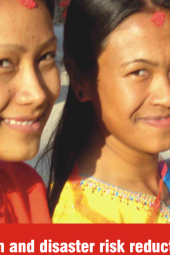Women and Disaster Risk Reduction
Summary
This document is a case study report on Women's involvement in building safer communities in South Asia in reference to Kathmandu Valley after a disaster. The Nepal Red Cross Society (NRCS) implemented the "Kathmandu Valley Earthquake Preparedness Initiative" (KVEPI) from September 2003 to June 2005, focusing on strengthening disaster preparedness and response capacities in communities, particularly in the earthquake-prone Kathmandu Valley. The program covered ten wards from three districts in the Kathmandu valley, targeting susceptibility to earthquakes. The initiative, funded by USAID/OFDA through the American Red Cross, amounted to $211,000 and aimed to benefit 250,000 individuals.
The program successfully engaged women at various levels, with a special emphasis on their participation. Female facilitators played a crucial role, leading to increased participation by women in interviews and group discussions. The initiative involved forming "mothers' clubs" in many communities, where women discussed community issues, including disaster preparedness, emergency funds, and monthly savings of resources. The training boosted women's knowledge of disaster preparedness, earthquake risks, and response measures, fostering confidence and community ownership. The formation of mothers' clubs aimed to ensure program sustainability and enhance social cohesion.
Categories:
Case Studies
Publisher:
Nepal Red Cross Society
Published Year:
2007
